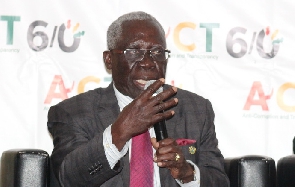 Senior Presidential Advisor, Yaw Osafo-Maafo
Senior Presidential Advisor, Yaw Osafo-Maafo
The Institute of Climate and Environmental Governance (ICEG) has disagreed with recent comments by Senior Presidential Advisor Yaw Osafo-Maafo, who said the dumsor timetable is the sole prerogative of the Minister of Energy, Dr. Mathew Opoku Prempeh.
In a statement released on Wednesday, March 24, 2024, and signed by Kwesi Yamoah Abaidoo, Policy Lead, Climate Finance and Energy Transition of ICEG, the statement contends that "while acknowledging the critical role of government agencies, including the Ministry of Energy, in managing and coordinating energy-related activities, it is crucial to emphasize the provisions of Section 3 of the Public Utilities Regulatory Commission Act (Act 538).
"According to this section, the PURC (Public Utilities Regulatory Commission) is tasked with safeguarding the interests of both consumers and utility service providers.
"In the view of ICEG, PURC is mandated to authorise the Electricity Company of Ghana to issue a timetable on dumsor to ease the stress on consumers, and this cannot be the sole right of the Minister of Energy."
Below is the full statement:
ICEG clarifies the statement regarding the power rationing (dumsor) timetable:
The Institute of Climate and Environmental Governance (ICEG) has taken note of recent statements made by the Senior Presidential Advisor, Yaw Osafo-Maafo. These statements suggested that only the Energy Minister possesses the authority to order the publication of the power rationing (Dumsor) timetable. In light of the ensuing concerns, ICEG aims to provide clarity on this matter and underscore the importance of collaborative efforts and transparency in addressing the current energy challenges.
While acknowledging the critical role of government agencies, including the Ministry of Energy, in managing and coordinating energy-related activities, it is crucial to emphasize the provisions of Section 3 of the Public Utilities Regulatory Commission Act (Act 538). According to this section, the PURC (Public Utilities Regulatory Commission) is tasked with safeguarding the interests of both consumers and utility service providers.
Additionally, the PURC is empowered to perform any other functions incidental to its primary responsibilities. Given that the publication of the Dumsor Timetable directly impacts consumers’ activities and interests, the PURC has the authority to order its release. Contrary to the Senior Presidential Advisor’s statement, the decision to publish the Dumsor timetable is not solely within the purview of the Energy Minister.
Instead, it necessitates a coordinated approach involving input from various institutions, including the PURC, ECG (Electricity Company of Ghana), IPGs (Independent Power Producers), and consumer representatives. Importantly, Section 4 of the PURC Act (Act 538) underscores the independence of the Commission. As such, the PURC operates autonomously and is not subject to the direction or control of any individual or authority in the execution of its functions.
The Institute of Climate and Environmental Governance (ICEG) remains steadfast in its commitment to promoting transparency, accountability, and stakeholder engagement in tackling the energy challenges facing our nation. We recognize that accurate and timely information is crucial to empower consumers, facilitate effective planning, and mitigate the impact of energy disruptions on businesses and communities.
In light of recent developments, ICEG urgently calls for increased collaboration and communication among all stakeholders. It is imperative that we address the underlying issues contributing to power rationing (Dumsor). By working together, we can find sustainable solutions that ensure reliable and affordable energy for all Ghanaians.